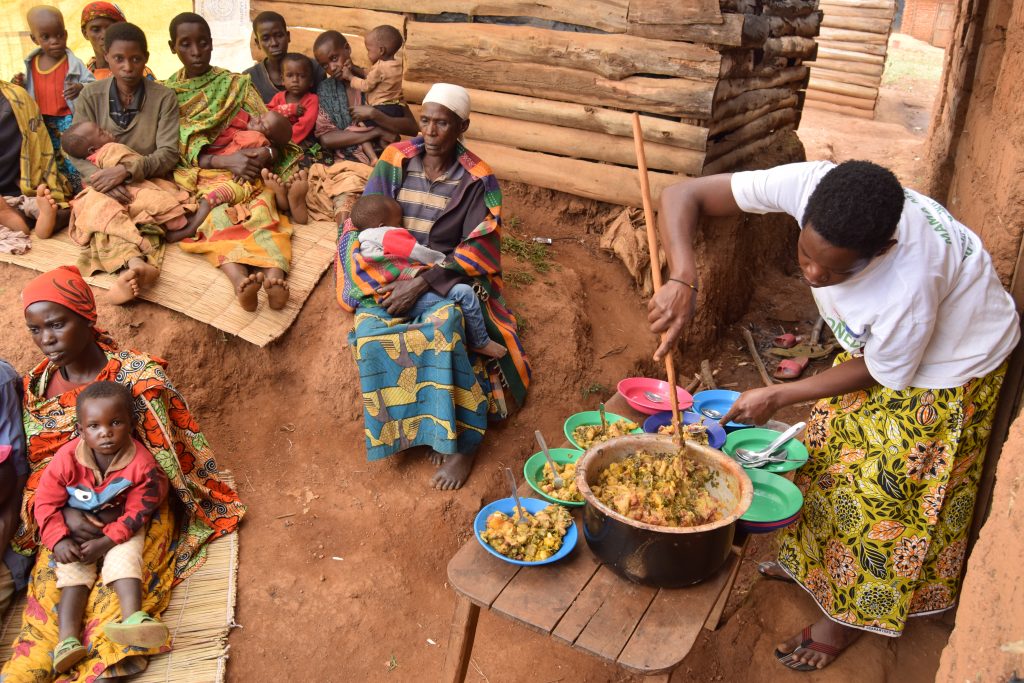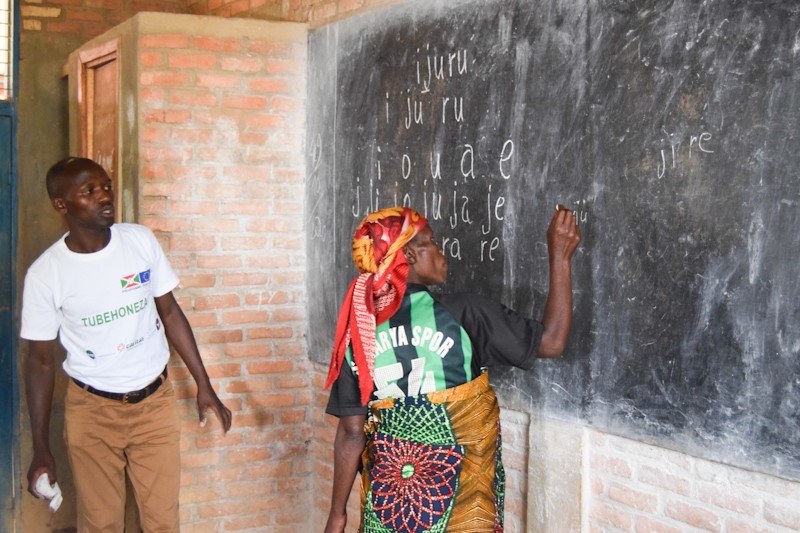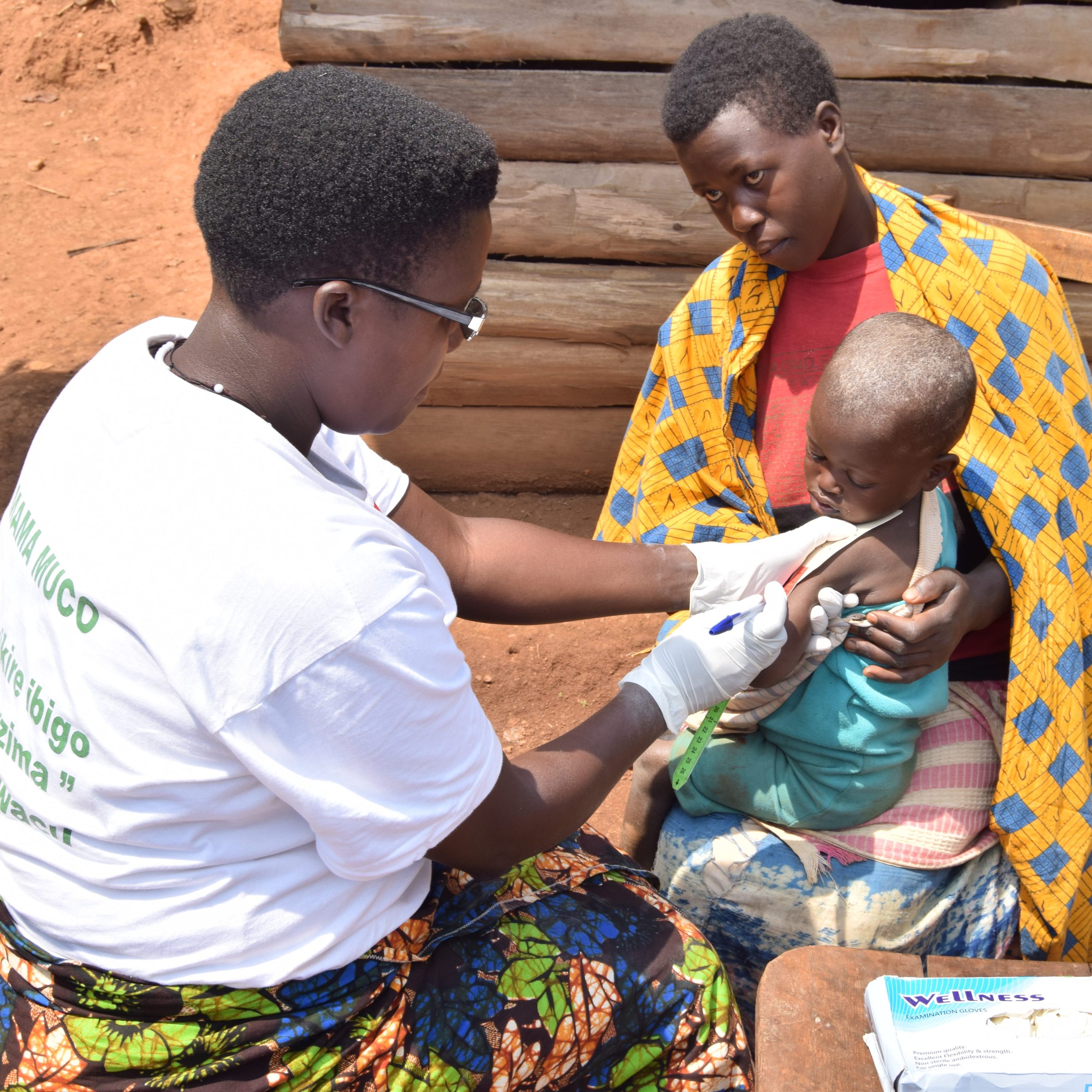Between August 2018 and July 2022, AVSI carried out as lead a project called "Projet d'Appui à la Résilience Communautaire dans le Buyenzi" also known with the acronym PRARECOM. It is one of 5 projects in the Tubehoneza Programme funded by the European Union, the overall aim of which is to strengthen the resilience of Burundi's rural population in a sustainable way.
It was part of a consortium with Vétérinaires Sans Frontières and Caritas International Belgique. The intervention area included the provinces of Ngozi (Gashikanwa and Mwumba communes) and Kayanza (Butaganzwa, Kayanza, Muruta, Matongo, and Kabarore communes). PRARECOM received funding totalling € 5,139,169. A final independent evaluation report published in July 2022 and carried out by experts revealed the positive results achieved by AVSI, particularly in the area of nutrition.
AVSI's contribution to reducing malnutrition
The report of the final independent evaluation conducted by experts highlighted the success of the nutrition component implemented by AVSI. The activities organized included:
- training for partners in the field,
- awareness-raising sessions for the authorities and communities,
- 7 mass screenings for children under the age of 5,
- case management of Moderate Acute Malnutrition (MAM) in the FARN
- and the transfer of children suffering from Severe Acute Malnutrition (SAM) to care facilities.
According to the report, AVSI's interventions have led to a gradual reduction in Global Acute Malnutrition (GAM) rates. Whereas at the start of the project at 1st screening, the rate of GAM in the communes varied between 8% and 9%, at the end of the project at 7th screening, these rates varied between 2% and 3%.

Remarkable innovations
According to the experts' report, there was a positive response to the introduction of food provision for the caregivers of children with severe acute malnutrition (SAM) who were referred to hospitals.
Before this initiative, caregivers who accompanied their SAM-afflicted children to hospitals faced challenges in accessing food due to limited resources. Their stay in the hospital's nutrition department typically lasted between 7 and 12 days. Recognizing that the absence of adequate food was causing a significant number of patients to discontinue their treatment, AVSI took the initiative to provide food support.
"We express our gratitude to this project for its support in providing our food supply at the hospital. Without them, it would be difficult for us to endure, especially considering the long distance we live from the hospital," said Daphrose Sindihebura while caring for her grandson at the hospital in Kabarore, Kayanza province.
In addition, organising the collection of food from the community to supply the FARNs was an innovative practice, as the families of children suffering from malnutrition could not have enough foodstuffs for the 12 days of a FARN session. The same report and the beneficiaries confirmed that the project's interventions had been very effective and had greatly reduced malnutrition.
Before, we didn't know what constituted a balanced diet; now my child has regained his appetite by applying the lessons learned
Gertrude Barakamfitiye, from the Kabuye zone, in the Matongo commune.
The mobilisation of the local authorities, in particular the hill chiefs, to collect food from the communities for the FARN was highly innovative. It was the first time this had been done in the action zone and, although this practice did not provide all the quantities needed, it did make a significant contribution to the operation of the FARN and the ownership of community care.
Encouraging results on literacy and post-literacy as a tool for social cohesion
The report also highlighted the positive outcomes of literacy and post-literacy activities for adults. These targeted training programs aimed to teach reading, writing, and numeracy skills to specific beneficiaries of the project. The objective was to provide them with opportunities for improved employment, active participation in community life, and the establishment and management of small-scale income-generating activities.
Within the project's intervention zone, there were 24 literacy centers where these training courses took place. A total of 24 literacy teachers conducted these courses, with 50% of them being women. These centers served as hubs for empowering individuals through education and skill development.
In the three literacy cohorts, a total of 1,851 individuals participated in the training program, and an impressive 1,811 of them successfully passed the tests. Among the successful candidates, 60% were women, indicating a significant representation of female participants. This achievement resulted in an overall pass rate of 90.7%. At the conclusion of the training, the successful individuals were awarded certificates to acknowledge their accomplishments.
Furthermore, the project took additional steps to support post-literacy activities. One such measure was providing reading materials in Kirundi, which were made available at the schools where the training sessions were conducted. This initiative aimed to encourage and sustain a reading culture among the trained individuals, allowing them to continue practicing and further enhancing their literacy skills.

"I know how to read the signs on a weighing scale, whereas in the past I used to get robbed when selling the produce from the harvest", said one of the graduates of these training courses.
A similar resilience project should be extended to other localities
The independent report concluded by stating that the three components of the project: food security, nutrition and social cohesion are important and constitute a major factor in community resilience. The report suggests that this experience should be extended to other localities, this time targeting all the hills on the same hill, in order to facilitate management and further strengthen cohesion within the same community.
The project in brief
The overall aim of PRARECOM was to contribute to the sustainable strengthening of the resilience of the population in the action zone. As part of this project, AVSI developed activities relating to nutrition and social cohesion, Caritas International Belgium those relating to agricultural production, access to credit/savings, labour-intensive work, AKASUGA latrines and the development of contingency plans, while those relating to animal production and the strengthening of POs through the construction of sheds were carried out by Vétérinaires Sans Frontières.
The beneficiaries of the project were vulnerable people like women, unemployed young people and landless farmers, voluntary returnees and internally displaced people, households or farmers and producer organisations. The total number of beneficiaries was 231,046, including 173,285 (75%) from poor or very poor households.




